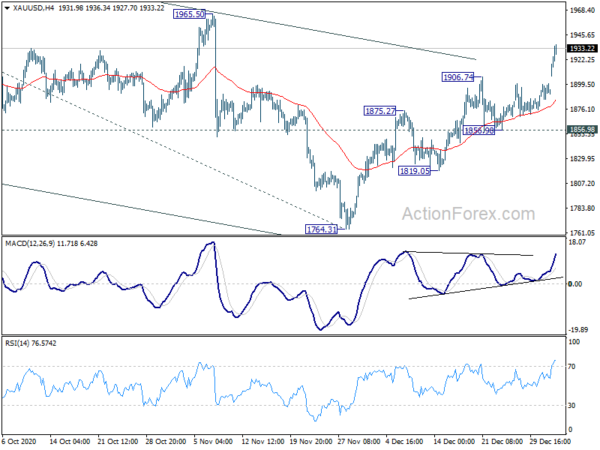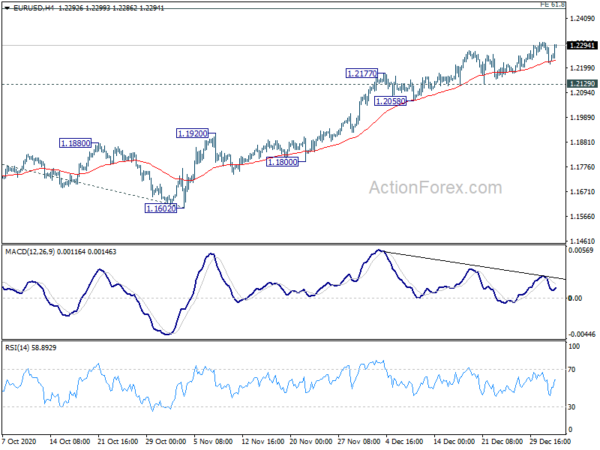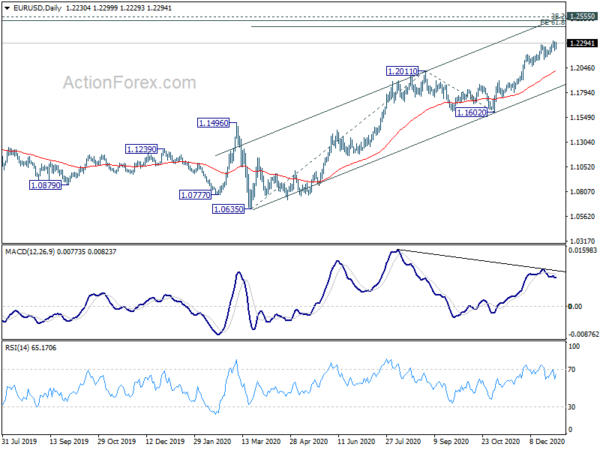Dollar’s selloff intensifies somewhat today, with solid risk appetite in the background. Though, Sterling is slightly weaker entering into US session. On the other hand, Euro and Swiss Franc are the strongest for now. Commodity currencies are also struggling to pick up buying despite rally in oil prices and Gold. Nevertheless, a busy week with ISMs and NFP from the US, as well as Fed and ECB minutes, would more likely trigger a committed direction, than not.
Technically, USD/JPY’s break of 102.87 and USD/CAD’s break of 1.2688 suggests down trend resumption. USD/CHF also breaks 0.8792. Eyes are now on when EUR/USD and AUD/USD would break through last week’s highs. Also, Gold is accelerating upside for now. Should Dollar’s selling takes off further, Gold could have a take on 1965.50 resistance sooner rather than later.
In Europe, currently, FTSE is up 2.52%. DAX is up 1.02%. CAC is up 1.42%. Germany 10-year yield is down -0.0218 at -0.593. Earlier in Asia, Nikkei dropped -0.68%. Hong Kong HSI rose 0.89%. China Shanghai SSE rose 0.86%. Singapore Strait Times rose 0.53%. Japan 10-year JGB yield dropped -0.0023 to 0.023.
Eurozone PMI manufacturing finalized at 55.2, solid performance a crucial support to the economy
Eurozone PMI Manufacturing was finalized at 55.2 in December, up from November’s 53.8. That’s also the highest reading since May 2018. Markit said there were stronger rises in output and new orders signalled. But supply side shortages led to delivery delays and price rises.
Looking at some member states, Germany PMI Manufacturing rose to 34-month high at 58.3. The Netherlands rose to 27-month high at 58.2. Ireland rose to 5-month high at 57.2. Italy rose to 52.8, France rose to 51.1, Spain rose to 51.0. But Greece stayed in contraction at 46.9, despite a 2-month high.
Chris Williamson, Chief Business Economist at IHS Markit said: “The solid performance of manufacturing amid the tightening of COVID-19 restrictions in the closing months of 2020 represents a major contrast to the lockdowns earlier in the year, with factories acting as a crucial support to the economy as the service sector is hit by tough social distancing measures…
The economy consequently looks set to be hit by the pandemic in the fourth quarter far less than the unprecedented decline in the second quarter thanks to the resilience of manufacturing, and an improvement in business expectations for 12 months ahead to the highest for almost three years suggests that momentum can be sustained in 2021. Rising virus case numbers are nevertheless likely to mean trading conditions remain challenging in the near-term and therefore constrain growth.”
UK PMI manufacturing finalized at 57.5, boost from last-minute Brexit preparations
UK PMI Manufacturing was finalized at 57.5 in December, up from November’s 55.6. That’s also a 37-month high. Markit said there were near-record increases in input stocks and purchasing activity. However, strong demand and transport issues stretched supply chains.
Rob Dobson, Director at IHS Markit: “The Manufacturing PMI rose to its highest level in over three years in December, mainly reflecting a boost from last-minute preparations before the end of the Brexit transition period. Customers, especially those based in the EU, brought forward purchases, boosting sales temporarily. It seems likely that this boost will reverse in the opening months of 2021, making for a weak start to the year. Note also that the December PMI data were collected prior to the border closures, which will have led to further logistics and production disruptions for many companies.”
Also from the UK, mortgage approvals rose to 105k in November, above expectation of 82k. M4 money supply rose 0.8% mom, above expectation of 0.4% mom.
Japan PMI Manufacturing finalized at 50, stabilization at the end of a tumultuous year
Japan PMI Manufacturing was finalized at 50.0 in December, up from November’s 49.0. Markit said output stabilized after 23 consecutive monthly falls. Also, employment rose for the first time since February.
Usamah Bhatti, Economist at IHS Markit, said: “The overall health of the Japanese manufacturing sector was boosted by output levels steadying following nearly two years of consistent declines. Although new orders reduced in the latest survey period, the fall was the softest recorded in the current sequence dating back to January 2019…
“Japanese manufacturing firms increased employment levels for the first time since February, albeit only fractionally… Businesses reported a sustained increase in optimism, with a third of respondents predicting a rise in output over the coming 12 months. This is in line with the IHS Markit forecast for industrial production to grow 7.3% in 2021.”
China Caixin PMI manufacturing dropped to 53.0, negative impact of pandemic further subsided
China Caixin PMI Manufacturing dropped to 53.0 in December, down from 54.9, missed expectation of 54.9. Markit said that output and new work expanded at slower, but still marked, rates. Staffing levels stagnated, despite further uptick in backlogs of work. Input costs increased at quickest rate for three years.
Wang Zhe, Senior Economist at Caixin Insight Group said: “In December, the negative impact of the pandemic on the domestic economy further subsided and the manufacturing industry continued to recover. Both the supply and demand sides continued to improve. Overseas demand also steadily increased. In terms of the trend, we expect the economic recovery in the post-epidemic era to continue for several months, and macroeconomic indicators will be stronger in the next six months, taking into account the low bases in the first half of 2020.
“Meanwhile, we need to pay attention to the mounting pressure on costs brought by the increase in raw material prices and its adverse impact on employment, which is particularly important for the design of the exit from stimulus policies implemented during the epidemic.”
EUR/USD Mid-Day Outlook
Daily Pivots: (S1) 1.2025; (P) 1.2134; (R1) 1.2242; More….
EUR/USD draw support from 4 hour 55 EMA and rebounds notably today. Overall, with 1.2129 support intact, further rise is expected. Current rally from 1.0635 should target 61.8% projection of 1.0635 to 1.2011 from 1.1602 at 1.2452 next. Though, considering bearish divergence condition in 4 hour MACD, break of 1.2129 support should confirm short term topping. Intraday bias will be turned back to the downside for deeper pull back.
In the bigger picture, rise from 1.0635 is seen as the third leg of the pattern from 1.0339 (2017 low). Further rally could be seen to cluster resistance at 1.2555 next, (38.2% retracement of 1.6039 to 1.0339 at 1.2516). This will remain the favored case as long as 1.1602 support holds. We’d be alerted to topping sign around 1.2516/55. But sustained break there will carry long term bullish implications.
Economic Indicators Update
| GMT | Ccy | Events | Actual | Forecast | Previous | Revised |
|---|---|---|---|---|---|---|
| 0:45 | JPY | Manufacturing PMI Dec F | 50 | 49.7 | 49.7 | |
| 1:45 | CNY | Caixin Manufacturing PMI Dec | 53 | 54.9 | 54.9 | |
| 8:45 | EUR | Italy Manufacturing PMI Dec | 52.8 | 53.6 | 51.5 | |
| 8:50 | EUR | France Manufacturing PMI Dec F | 51.1 | 51.1 | 51.1 | |
| 8:55 | EUR | Germany Manufacturing PMI Dec F | 58.3 | 58.6 | 58.6 | |
| 9:00 | EUR | Eurozone Manufacturing PMI Dec F | 55.2 | 55.5 | 55.5 | |
| 9:30 | GBP | Manufacturing PMI Dec F | 57.5 | 57.3 | 57.3 | |
| 9:30 | GBP | Mortgage Approvals Nov | 105K | 82K | 98K | |
| 9:30 | GBP | M4 Money Supply M/M Nov | 0.80% | 0.40% | 0.60% | |
| 14:30 | CAD | Manufacturing PMI Dec | 55.8 | |||
| 14:45 | USD | Manufacturing PMI Dec F | 56.5 | 56.5 | ||
| 15:00 | USD | Construction Spending M/M Nov | 0.90% | 1.30% |



